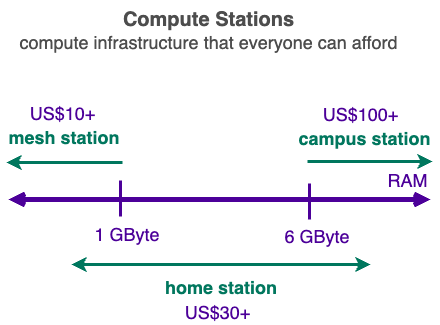Mesh Compute Station
Mesh Stations takes advantage of the millions of existing compute devices in the community and repurpose them to provide basic communication and storage infrastructure to Private Cyberspaces.
Mesh Stations give your Private Cyberspace communication bandwidth and storage capacity at revolutionary price points by combining free yet featureful software (e.g. OpenWrt) with low cost yet powerful hardware (e.g. Raspberry Pi).
We have tested and actively support a number of operating systems (currently DietPi, Armbian, Raspberry Pi OS and OpenWrt) and we welcome the community to introduce others.
If your device is supported by multiple operating systems and you have no particular preference, then the recommended order to try them out is currently DietPi then Armbian then Raspberry Pi OS then OpenWrt.
Note Armbian and DietPi are quite similar in many ways, so we are grouping them together on this page. Some devices are BETTER supported in one or the other.
Mesh Compute Station (also referred to as "Mesh Station" or just "MS") provide UBIQUITOUS compute power to the physical environment.
Mesh Stations takes advantage of the millions of existing compute devices in the community and repurpose them to provide basic communication and storage infrastructure to Private Cyberspaces.
Mesh Stations give your Private Cyberspace communication bandwidth and storage capacity at revolutionary price points by combining free yet featureful software (e.g. OpenWrt) with low cost yet powerful hardware (e.g. Raspberry Pi).
In order to deploy billions of Mesh Stations (e.g. having a Mesh Station sitting on the window sill of every room in the world) they have been designed with extreme low cost in mind.
When we are talking about tens of billions of devices , saving just 10 cents in each device is a billion dollar saving.
Even most savings are possible if we turn devices rubbish bin into mesh stations.

